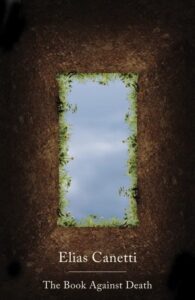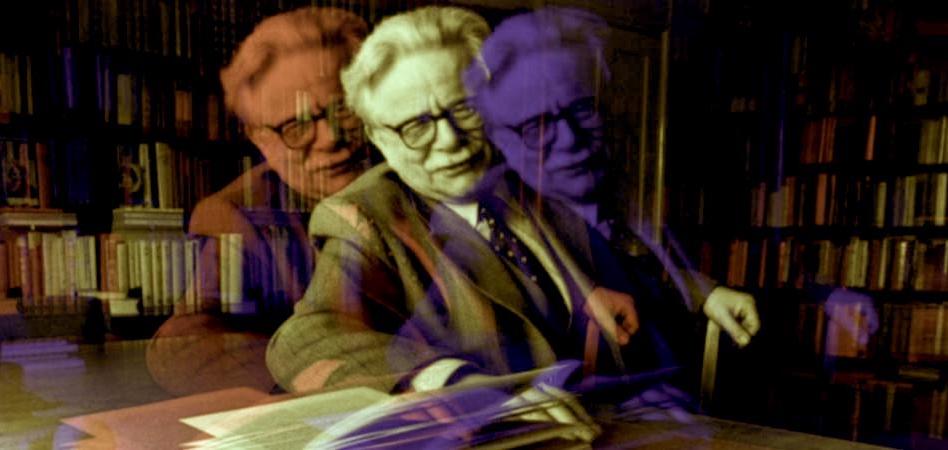What Comes For Us All: Read Elias Canetti on the Many Guises of Death
On Those Who End Life and Those Whose Lives End
In order to manifest death entirely, she looks for insects to kill.
He wants to die in secret, so that no one feels triumphant, and for his last meal he’ll eat his will.
The urgency of the dead: they want to get away as fast as possible from the explosions.
No one will survive him; anyone who could stand him is dead.
Too little attention is paid to what remains alive of the dead and is dispersed among others; no method has been conceived to nourish these dispersed remains and to keep them alive for as long as possible.
The friends of a dead man gather together on appointed days and talk only about him. They make him even more dead when they only say good things about him. They should quarrel instead, take sides for or against him, talk about his secret escapades. So long as there is something surprising to say about him, he changes in their view and is not dead. The piety involved in preserving a fixed notion of him is not at all kind. It rises out of fear and will only keep him somewhere harmless, such as in the coffin and in the ground. So that the dead man, by the slimmest of margins, can continue to live, he must be allowed to move. He should be angry, as before, and in anger should require an unexpected curse word that is known only to the one who reports it. He should become tender; those who knew him as hard-hearted and uncaring should suddenly learn how loving he could be. One almost wishes that each friend will have a different role to depict for the dead man, and out of all of them together he will then exist. One could also allow the younger and uninitiated to take part in these gatherings, so that they can learn as much as possible about someone who was unknown to them. Certain objects associated with him should be passed from hand to hand, and it would be lovely when, at each annual gathering a new and unfamiliar object is brought along that holds a story.
The word “freedom” gives rise to an important enticement, perhaps the most important enticement that can be expressed. We always wish to get away, and when there is no name for where we want to get to, when we do not know and there is no border in between, then we call it “freedom.”
The spatial sense of this enticement is the deep wish to step across a border as if it were not there. The freedom of flight stretches back to the ancient, mythic urge to reach the sun. The freedom of time involves the conquering of death, and one is indeed happy the farther and farther it can be pushed off. The freedom in relation to things is the disappearance of prices, and the ideal prodigal, a very free man, wishes for nothing so much as to be uninfluenced by and not needing to worry about constantly changing prices, which always go up and down, much like the weather, and for no good reason. There is no such thing as a “bit” of freedom, for its grace and happiness entices the man who wants to break through whatever holds him back, and he always wishes for this in order to free himself from the worst restraints. Anyone who wants to kill has to deal with the awful consequences that come with the law against killing, and if these consequences weren’t such a threat, he would certainly embrace even more satisfying enticements. However the source of freedom lies in breathing. You can breathe any air, and the freedom to breathe is the only freedom that to this day has not really been destroyed.
Molière’s death: He cannot stop acting. The great roles that he plays, and the applause which the theater showers upon him,
means too much to him. His friends urge him again and again to give up acting, but he resists their well-meaning suggestions. Even on the day of his death he said he could not deny his fellow actors the chance to earn a living. In reality it was about the applause, for it appears he could not live without it. So it is curious that on the day of his funeral a hostile crowd gathered before his house, the very opposite of the crowds he encountered in the theater. They were there out of religious conviction, but as if knowing that they were secretly linked with the clapping crowds of the theater, they dispersed when money was tossed to them—namely the ticket sales that were returned.
The dead are nourished on judgment, the living on love.
The “slain”—how grand that sounds, how expansive, how embracing and brave: the “suffocated,” the “crushed,” the “charred,” the “exploded”; how cheap they all sound, as if no price had been paid!
There is no longer any way to measure anything once the length of a human life is no longer the measure.
He wants to return to the lush, splendid world in which no one dies and people have their wars fought by ants, which are very human.
Human beings are eternal to the degree that they care for the eternal—unless of course they drown in it.
It’s too easy to die. It should be much harder to die.
The promise of immortality is all that is needed to set up a religion. The simple command to kill is all that is needed to wipe out three-fourths of humanity. What do people want—to live or to die? They want to live and to kill, and as long as they want that, they will have to be satisfied with various promises about immortality.
Revenge is a curse, and should they slay my dearest brother, I will have nothing to do with revenge. Instead, I want different human beings.
Wars are fought for their own sake. So long as people don’t admit that, there will never actually be any way to oppose them.
He hopes, without God noticing, to live a long time.
Above all, you are afraid of what does not come after death.
Immortality is hardest for the miser.
O, if only I had died ten-thousand years ago, and already lived again three times since.
He loves the wind and lets himself be incinerated to at last be carried off by it.
On each of his birthdays he holds a little funeral celebration for himself, for isn’t it possible that he could have died already?
He never wants to die again.
__________________________________

From The Book Against Death by Elias Canetti. Used with permission of the publisher, New Directions. Translation copyright © 2024 by Peter Filkins.




















